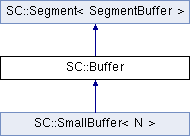An heap allocated byte buffer that can optionally use an inline buffer. More...
#include <Buffer.h>

Public Member Functions | |
| Segment (uint32_t capacityInBytes, SegmentAllocator allocator=SegmentAllocator::Global) noexcept | |
| Segment () noexcept | |
| Segment (Segment &&other) noexcept | |
| Segment (const Segment &other) noexcept | |
| template<typename U = T> | |
| Segment (Span< const U > span) noexcept | |
| Segment (std::initializer_list< T > list) noexcept | |
Friends | |
| template<typename VTable2 > | |
| struct | Segment |
An heap allocated byte buffer that can optionally use an inline buffer.
Example: